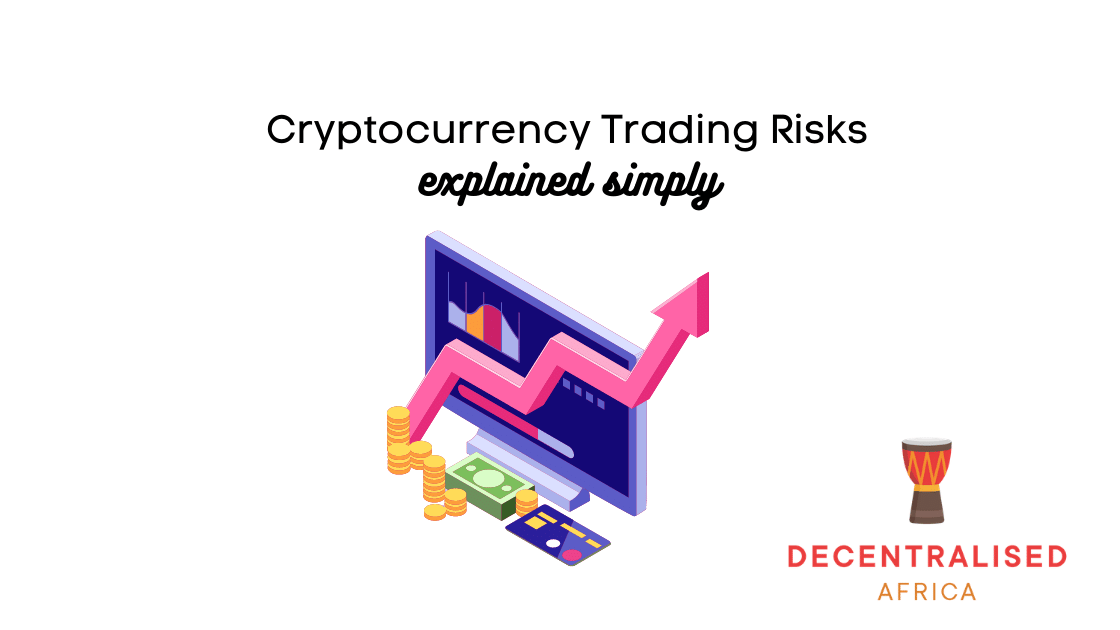
How to Manage Risk When Trading Cryptocurrencies
The risks associated with trading digital currencies outlined.
Trading digital currencies poses risks such as loss of funds. Major risks cryptocurrency traders face include price volatility, cyber-crimes, mishandling of private keys and insecure trading platforms.
Price Volatility
Prices of cryptocurrency can change within a short time and with large margins. For example, the price can rise or decrease by hundreds or thousands of dollars within a day. Therefore, a sharp decrease in the price of a cryptocurrency can result in a perceived loss on the part of the trader holding the particular crypto whose price has dropped.
An example of price volatility is that of Bitcoin. To illustrate, on 17 December 2017, the price of bitcoin was over US$20 000. However, a year later, on 6 November 2018, its price was around $6,460. This is a case of huge price fluctuation.
Price manipulation by crypto whales has also been alleged.
Workable solutions
Traders can hedge against such price fluctuations through:
- Scanning for latest news on price changes and act accordingly. You can get up-to-date news through crypto news aggregators such as Cointelegraph, CoinDesk, Bitcoinist and Hacker Noon.
- Analysing cryptocurrency indicators. This gives you some idea of trends in price changes.
- Getting reliable information and tools to help you learn more about the markets. We have an entire section dedicated to providing you with the resources you need to help you navigate the crypto space.
- Trading with the amount of money you are prepared to lose.
- Avoid complex products such as derivatives if you’re a novice trader.
- Put strategy, technicals and common sense over emotions.
Cybercrimes
This is one of the greatest risks that crypto traders face. For instance, hacking results in great loss for traders. Sadly, a user can lose his/her entire amount of cryptocurrencies in a trading platform. For example, in August 2016, Bitifinex lost $72 million worth of bitcoins from hacking. All affected users lost their bitcoins.
Workable solutions: A trader should use a platform that has an insurance or which is highly secure such as Kraken, PrimeXBT or Coinbase. Also it is highly advisable that people store their crypto in non-custodial wallets such as Exodus.
Also, an individual should not store all his/her cryptocurrencies on a single exchange or wallet. If you want to trade large amounts of cryptocurrencies, it is best to distribute the crypto across different regulated exchanges.
Apart from hackers, there are also fraudsters targeting your cryptocurrencies. Many fake crypto exchanges or trading sites are on the all over the internet. On these platforms, fraudsters dupe traders, particularly beginners.
Workable solutions: Use only well-established exchanges such as Bitcoin.com, Luno, Coinbase, Binance, Paxful, and so forth. Avoid dealing with unpopular and untested trading platforms.
Mishandling of private keys
Every wallet owner has a private or wallet key which enables him/her to access the cryptocurrency stored there. However, there is a chance of losing the private key. Specifically, the gadget in which you store the private key may malfunction beyond repair eg. if stores on a computer hard-drive . In such case, you lose all your cryptocurrencies. However, if you use hardware wallets such as Ledger, you can always replace the devise and use you backup phrase to recover your funds.
Second, thieves may steal your phone or computer resulting in loss of your wallet key. In addition, if an unauthorized person accesses your private key, he/she can steal your digital assets. All these are serious risks you can come across.
Workable solutions
The best way to secure your cryptocurrencies is to use hard wallets such as Ledger, Trezor Model T, Cobo Vault, Keepkey and so forth. With such wallets, only the owner has access to the private keys.
It is equally essential to keep your private keys and seed phrases in different secure places, in order to retrieve a lost wallet.
Lack of regulations
Currently, many countries do not have regulations on cryptocurrencies. As a result, trading platforms may manipulate their systems to gain on the expense of traders. On the contrary, if countries effect legislations, traders may lose access to exchange platforms which act as gateways between the fiat and the crypto world. There are many decentralised exchanges such as Uniswap which are not easy to regulate and which many crypto traders may resort to if regulations become unfavourable. Also, if a government introduces taxation laws, traders can be affected negatively, resulting in loss of their cryptocurrencies.
No consumer protection
Another risk arises from the irreversibility of transactions. If a person sends his/her coins to a wrong wallet address, it is not possible to reverse that. This is because there is no intermediary to crypto transactions. The only way to recover the coins is through persuading the other party to return the cryptocurrency. If they go to a wallet of a person or entity you do not know, you completely lose them.
Workable solutions: It is important to carry out transactions with parties you trust. Above this, make sure that you send the cryptocurrency to the right wallet address and in the right amounts. Therefore, when carrying out cryptocurrency transaction, do not hurry through the process. Check and counter-check wallet addresses and the amounts, before executing transactions.
Trading the wrong cryptocurrencies
Many people lose out when they trade worthless cryptocurrencies called shitcoins. These are coins that do not have value and end up becoming rug pulls, resulting in substantial loss.
The best advice is that you need to trade with reputable and established cryptocurrencies such as Bitcoin, Bitcoin Cash, Ethereum.
What to do to ensure you invest in a worthy cryptocurrency?
- Check for the trading volume of the cryptocurrency on established information aggregators such as coinmarketcap.com, Coindesk, Coinddit, Coinspectator and CryptoPanic.
- Second, deal with cryptocurrencies listed on major exchanges like Binance, Huobi Global, OKEX and ZG.com.
- Check the development activity e.g. on GitHub
- Analyse the project teams and their credentials.
- Analyse the project capabilities and the milestones as set in their roadmap.
- Analyse community participation and ecosystem engagement.
- Check what partnerships the crypto project has and how credible they are.
- Beware of liquidity risks especially in alternative coins (alt coins) where you may end up unable to convert your position to fiat currencies that you can readily use for everyday transactions.
Summing up
There are other risks associated with trading cryptocurrencies including:
- Slow adoption rates and limited use of cryptocurrencies on a day-to-day basis especially for micro transactions.
- Resistance from governments.
- The fast-changing nature of the crypto industry which can be disruptive.
Nonetheless, with enough knowledge and experience which you can gain through crypto trading and investing educational platforms such as Crypto University, you can reduce some of the risks that can be encountered when trading digital assets.
Disclaimer: This article is intended to highlight some of the risks associated with cryptocurrency trading. None of the information on the website or in this article should ever be considered financial advice.







